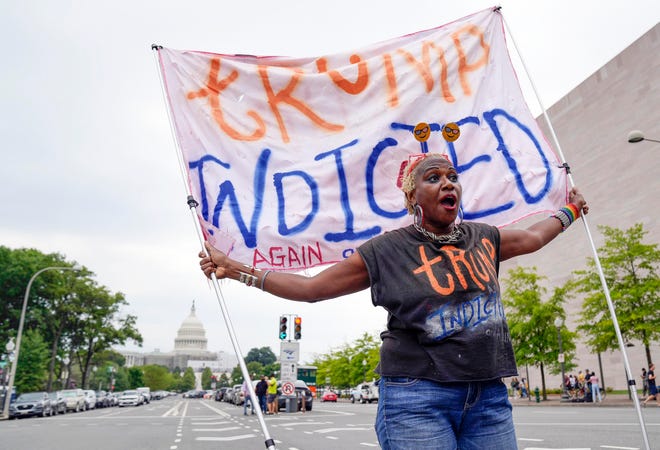Exclusive: It's not the economy, stupid. In NH, democracy is the top issue for Dems, independents

For Democratic and independent voters in New Hampshire this year, the most important issue facing the United States isn't the economy, the sort of kitchen-table quandaries that more often than not determine presidential elections.
It's the future of democracy.
A new USA TODAY/Boston Globe/Suffolk University Poll two weeks before the Granite State's pivotal primary finds half of Democrats (49%) and nearly 3 in 10 independents (29%) rank that solemn and even philosophical question well above such concrete concerns as health care or crime − defying the conventional political wisdom of decades that "It's the economy, stupid."
The survey was taken amid a series of stress tests for the nation's democratic institutions, including a federal appeals court hearing Tuesday to consider whether Donald Trump should be immune from criminal prosecution for actions he took while president. A few weeks later, the Supreme Court has scheduled oral arguments in a case that considers whether Trump can be bumped off state ballots because of a constitutional ban on insurrectionists.
On Monday, President Joe Biden delivered his second speech in four days on concerns about democracy and freedom, speaking from the pulpit of the historic Emanuel AME Church in Charleston, South Carolina, site of a deadly mass shooting by a white nationalist in 2015.
"It's really just all morphed into saving democracy," Christine Hayes, 50, a nurse from Rochester, New Hampshire, said in a follow-up interview after being called in the survey. An independent, she plans to vote for former U.N. ambassador Nikki Haley in the Republican primary and then President Joe Biden in the general election. "We need democracy to be protected in this world, and so that then we can fight for reproductive freedom, so that we can work on climate change, so that we can have conversations.
"The whole political theater has just devolved in partisan craziness," she said. "But I think my issue now is democracy."
Overall, from a list of nine issues, democracy was chosen by 30% as the most important, followed by immigration by 24% and the economy by 17%. No other issue broke into double digits.
The poll of 1,000 likely primary voters, taken by landline and cellphone Jan. 3-7, has a margin of error of plus or minus 3.1 percentage points.
In a hypothetical general-election matchup, Biden led Trump 42%-34%, with independent candidate Robert F. Kennedy Jr. at 8%.
In some ways, New Hampshire isn't a particularly representative state, with an overwhelmingly white population and politics that leans libertarian. But it is a place where the residents already have been paying close attention to the presidential campaign and its candidates, with views that could prove to be a harbinger for the rest of the country.
Their focus on such a fundamental precept − on the survival of the American experiment − underscores how high the stakes of this election seem to many citizens.
In the GOP, it's all about the border
Republicans also have a dominant issue that isn't the economy: immigration and border security.
A 51% majority of likely GOP voters call immigration the nation's most important issue, followed by 23% who cite the economy and 11% democracy.
Nearly half of all those surveyed, 47%, call the U.S. border "an emergency situation," and another 32% say it is "a major problem."
That's notable in a state that sits along the northern border, next to Canada, which has been considerably less disrupted by a flood of migrants than the southern border along Mexico.
Though most dismiss alarm about the Canadian border − 44% say they are "not at all concerned" and another 17% "not very concerned" − some worry that problems loom ahead.
"I feel Canada is probably going to be starting to see, you know, the immigration, the illegal immigrants, cross their borders this way," said Iris Buzzell, 53, a Republican from Concord and a health care professional who supports Trump.
She said migrants already are camping in the New Hampshire woods. "It's horrible, the damage that they're doing to the wildlife, the damage that they're doing to our clean water," she said. "The crime rate is going up. We need to do something."
Concern about immigration on the southern border is fueling criticism of Biden not only among Republicans but also among some Democrats and independents. On a list of eight areas of presidential action, Biden's handling of the southern border is the most corrosive, prompting 51% of those surveyed to be less likely to support him and just 10% more likely to support him.
Biden's best issue: Access to abortion
Though his handling of immigration is costing Biden's support, his backing of abortion rights is bolstering him the most.
By 2-1, 48%-25%, those surveyed say Biden's stance on abortion makes them more likely, not less likely, to support him. Among independents, the swing voters who often determine elections, that divide is 52%-20%.
For many, abortion is a voting issue.
Nearly 1 in 4 (23%) say their opposition to the Supreme Court decision overturning Roe v. Wade, which recognized access to abortion as a constitutionally protected right, was "the main factor" motivating their vote in 2024. Another 1 in 3 (32%) say it is among the issues affecting their vote, though not the only one.
In contrast, just 16% say their support for the court's decision is a factor in their vote.
"I don't need my state legislator or federal legislator in my OB-GYN's office," said Lynne Snierson, 71, a freelance writer from Hampstead and an independent who supports Biden.
"They didn't go to medical school," she said. "It's between a woman and her doctor and her conscience − the end, full stop."